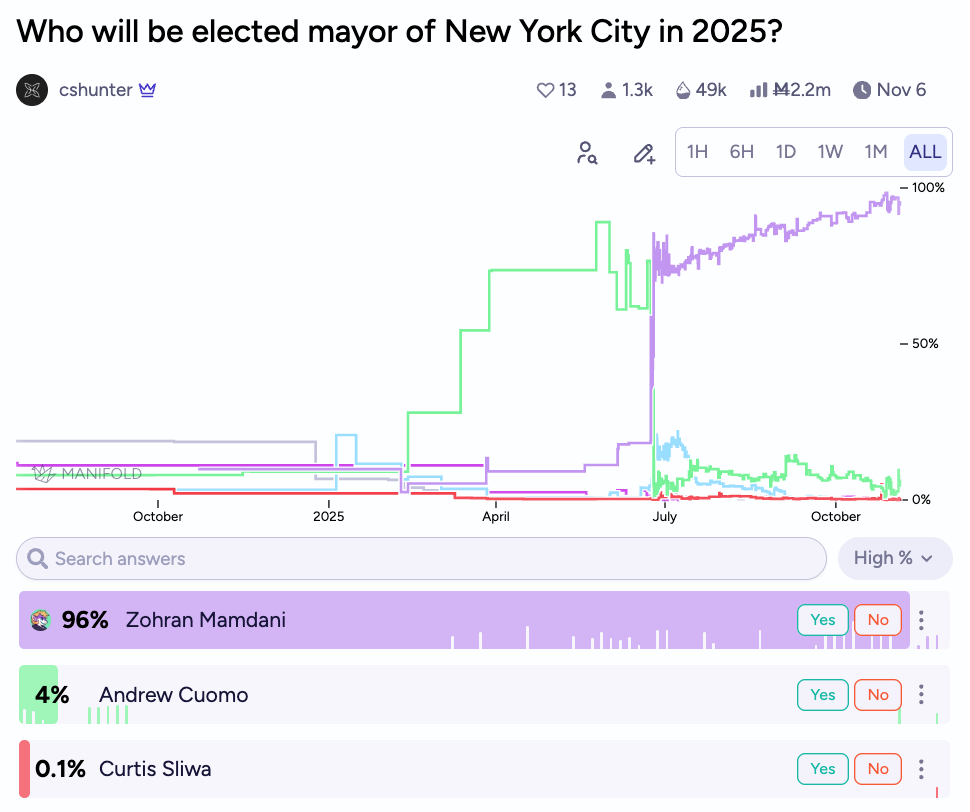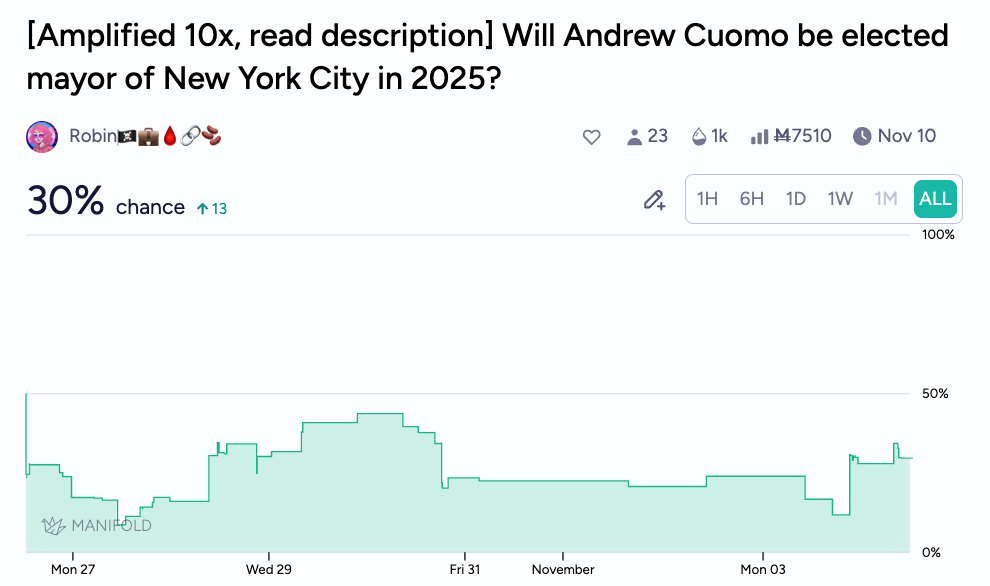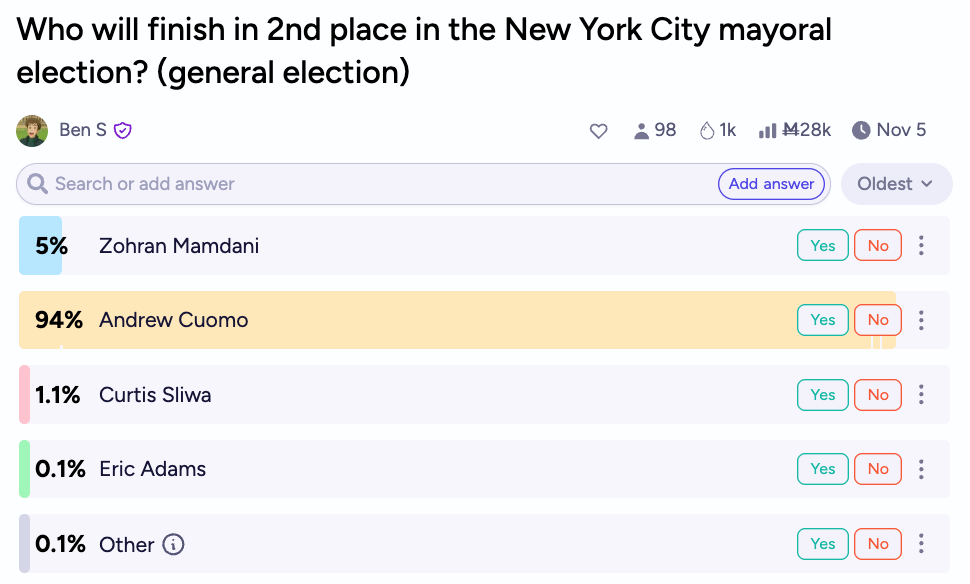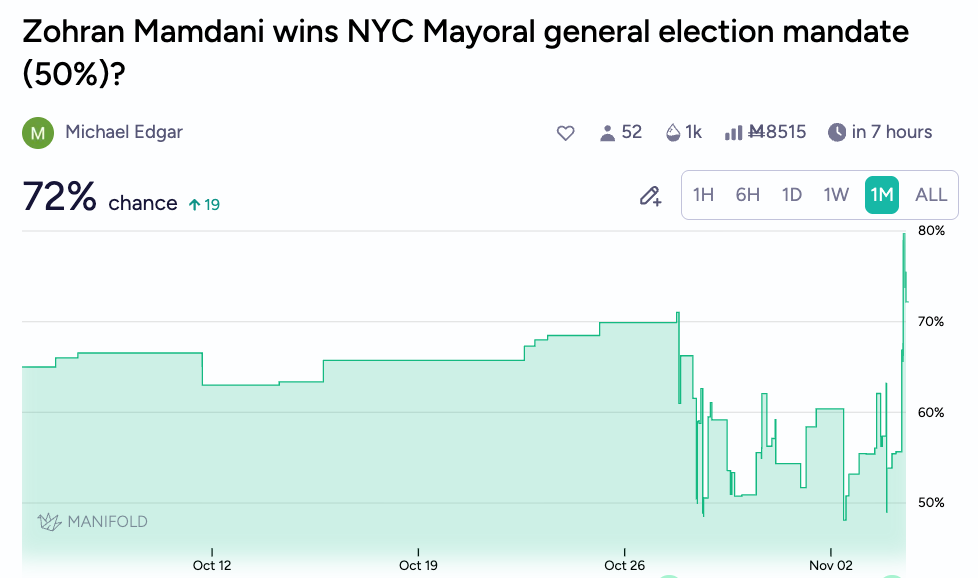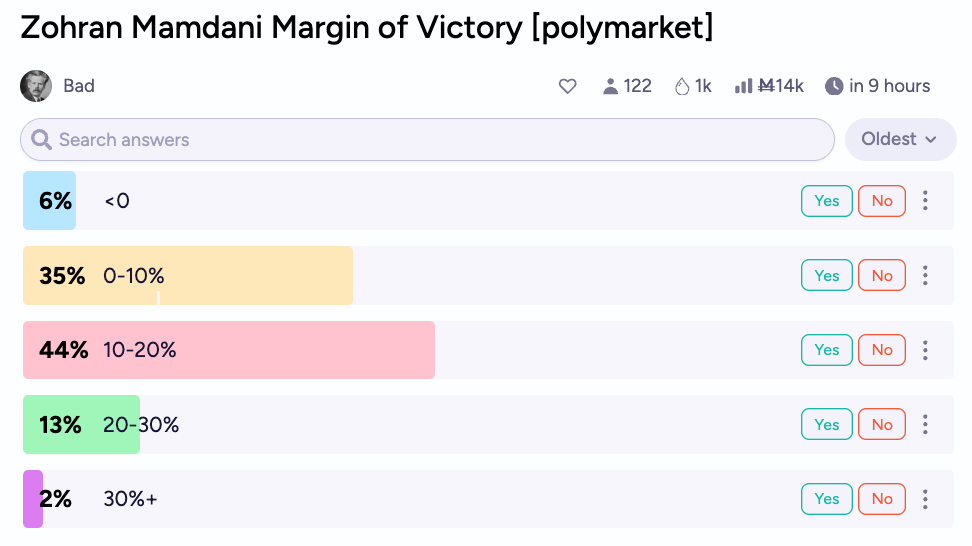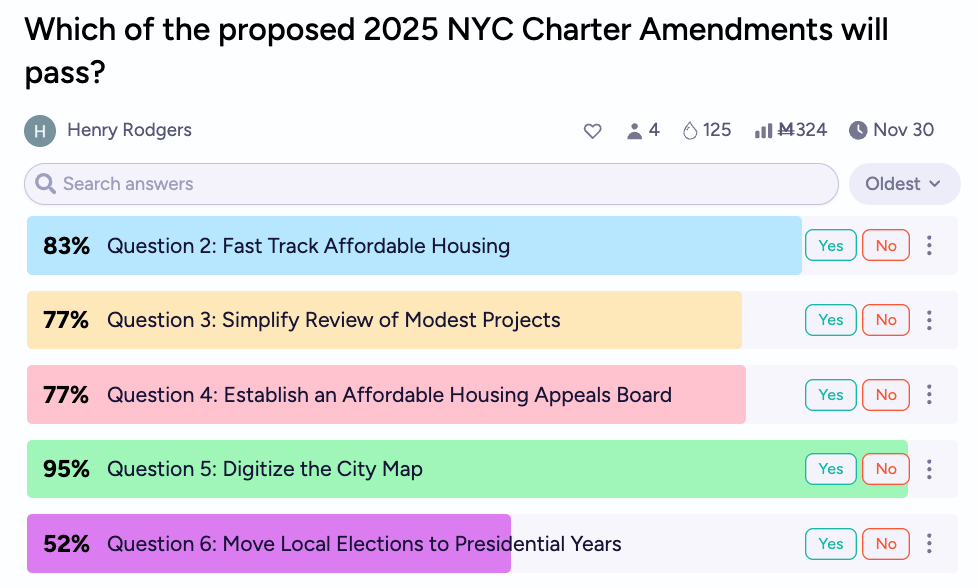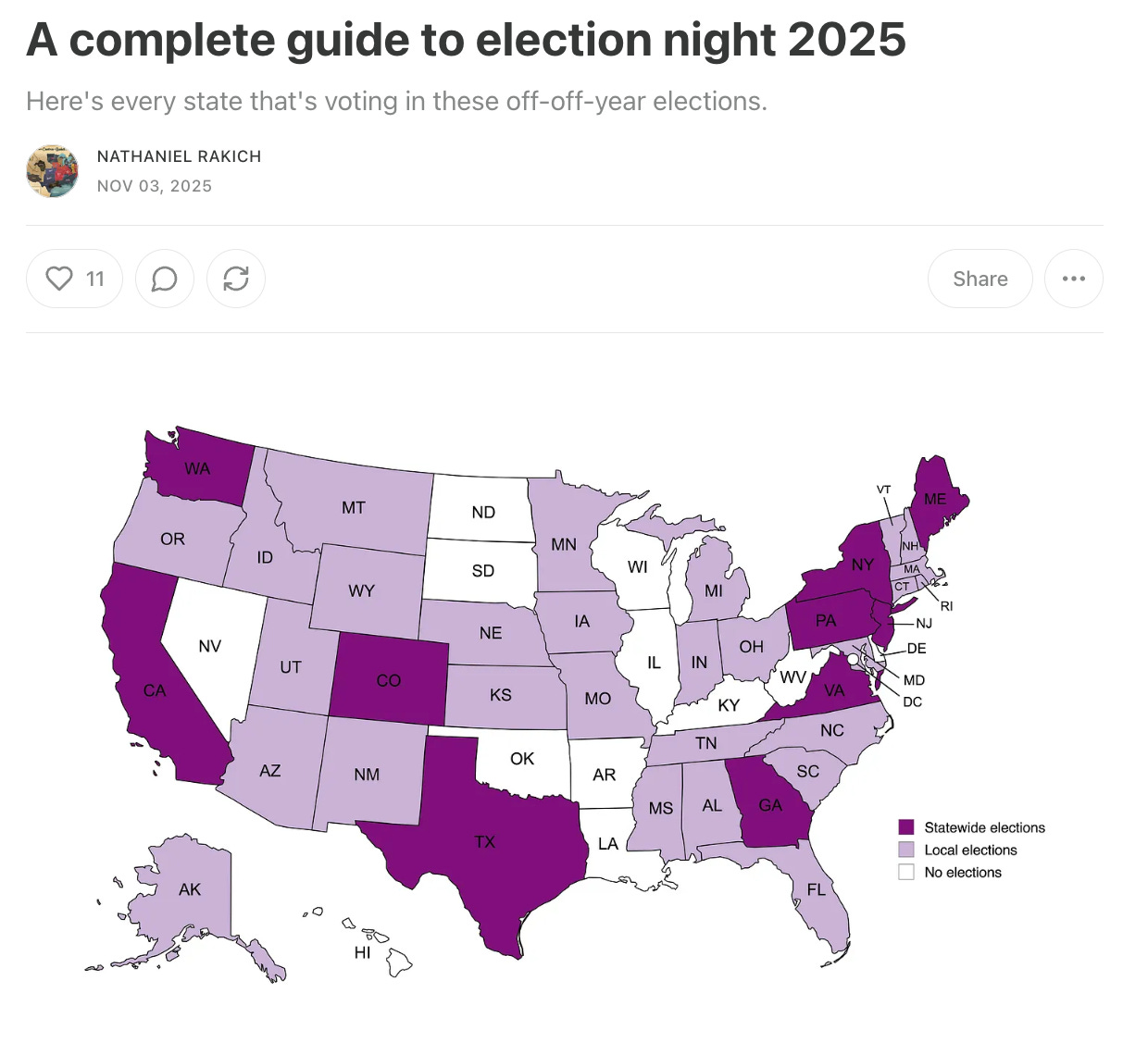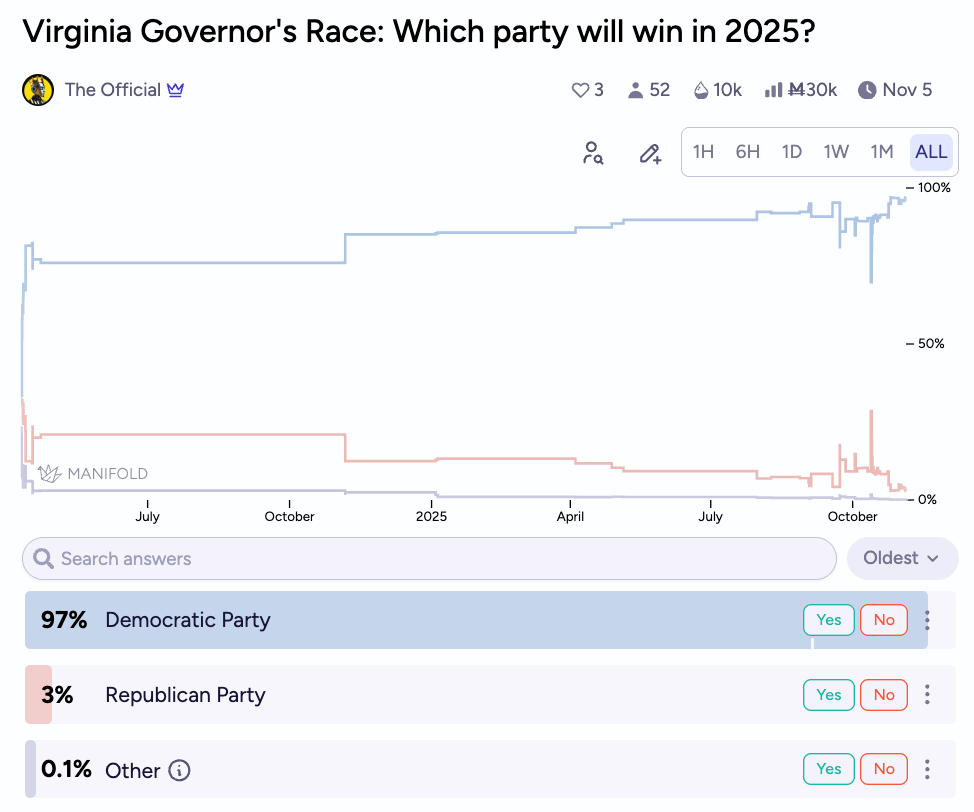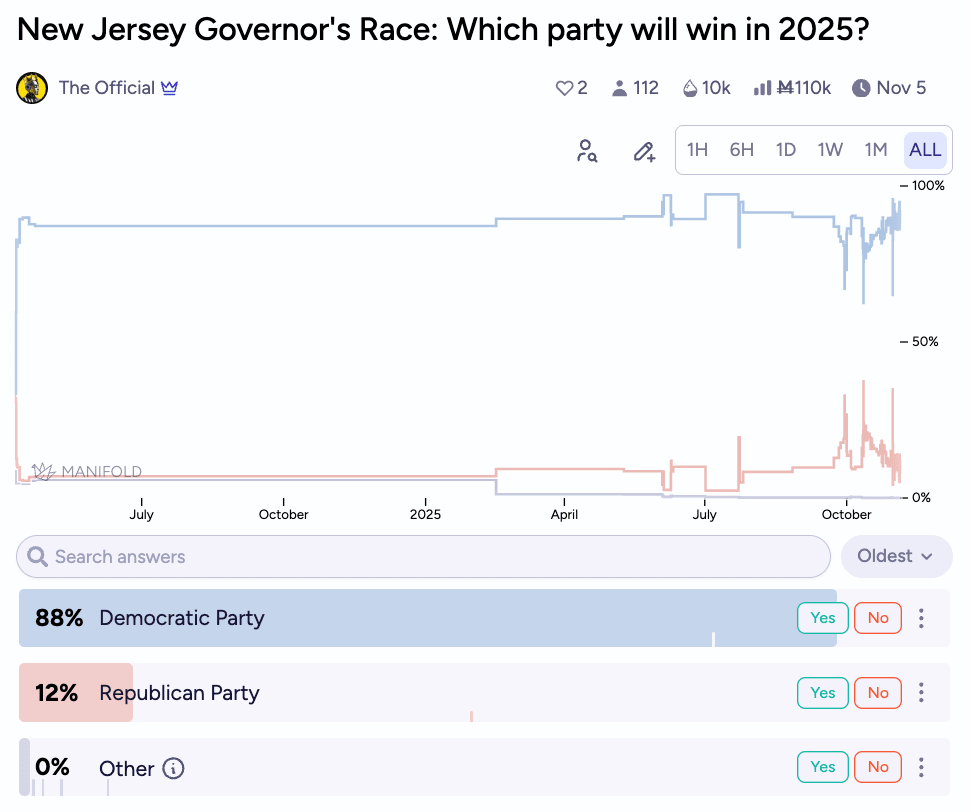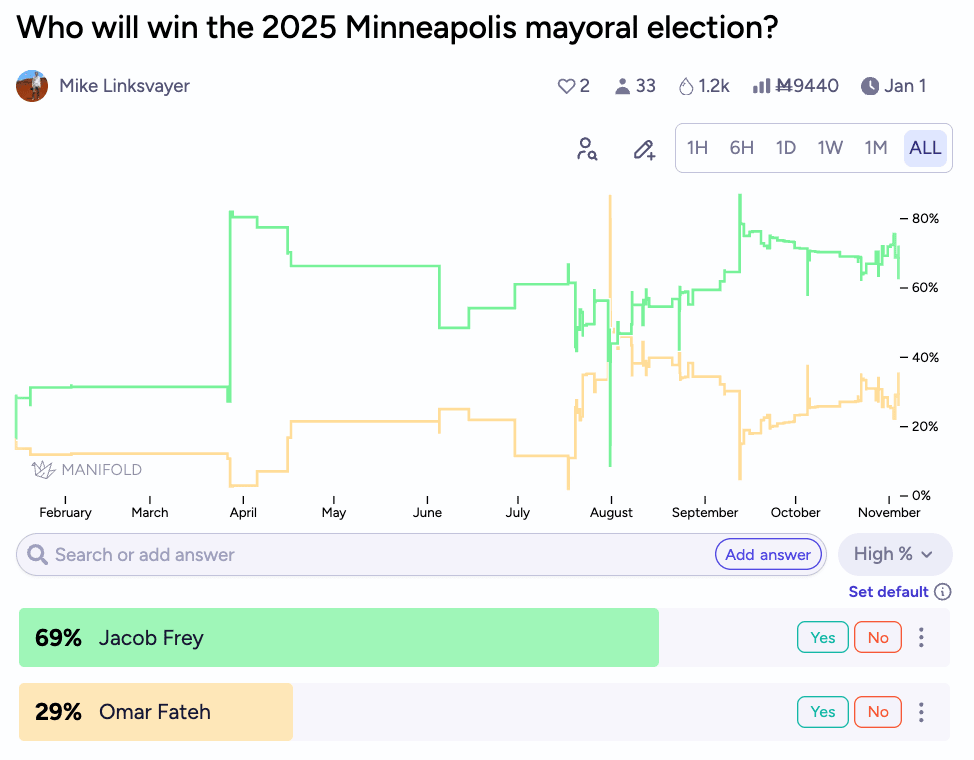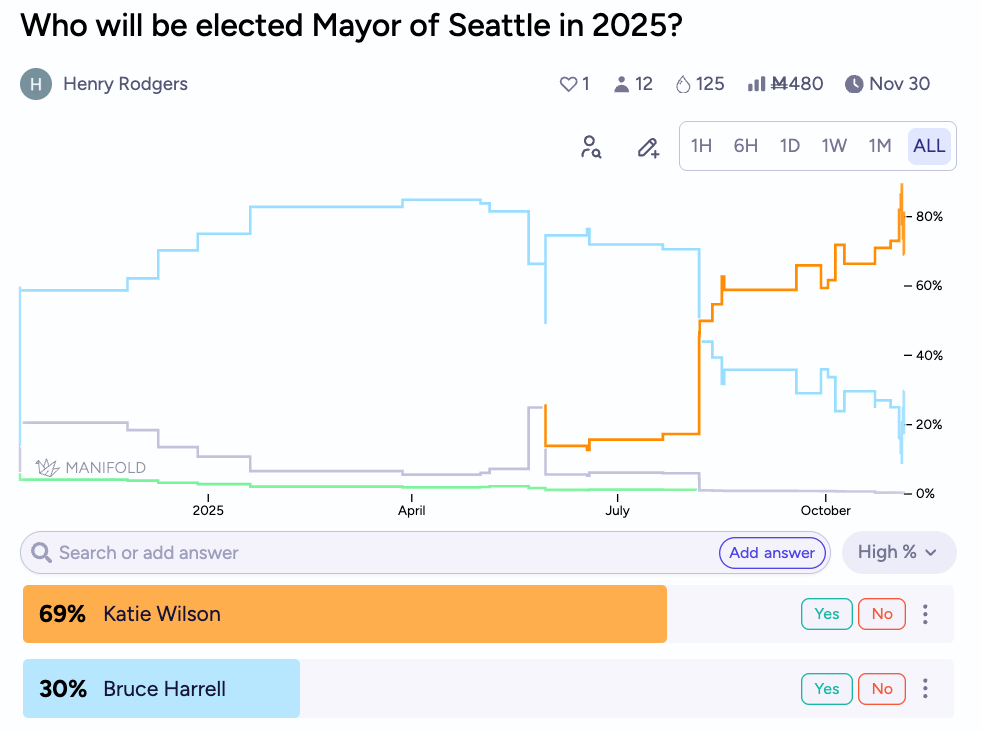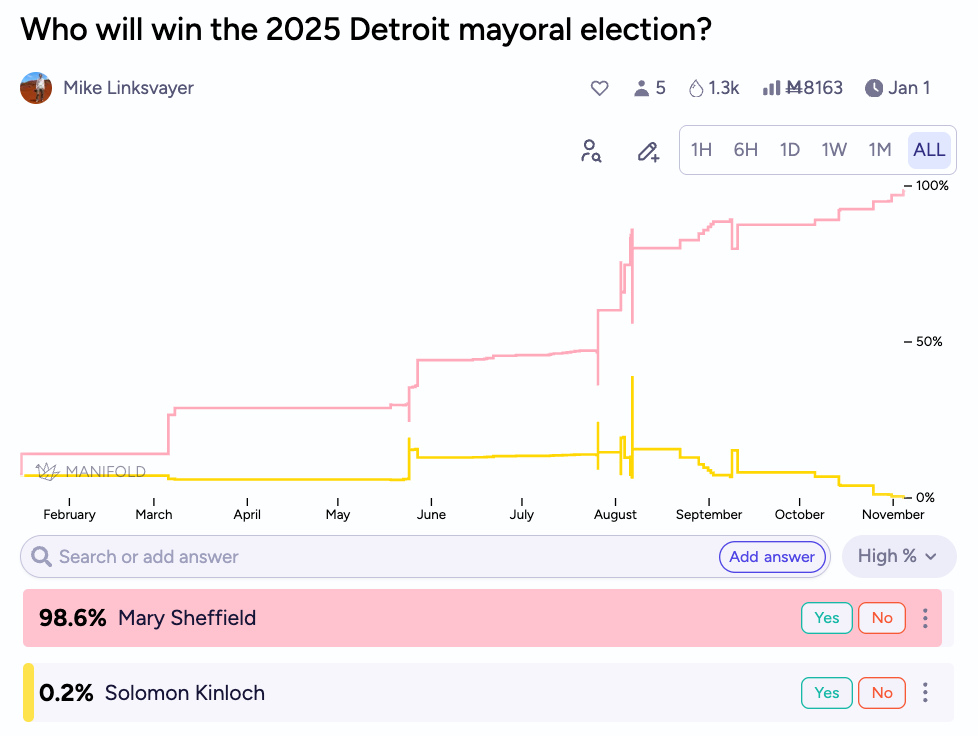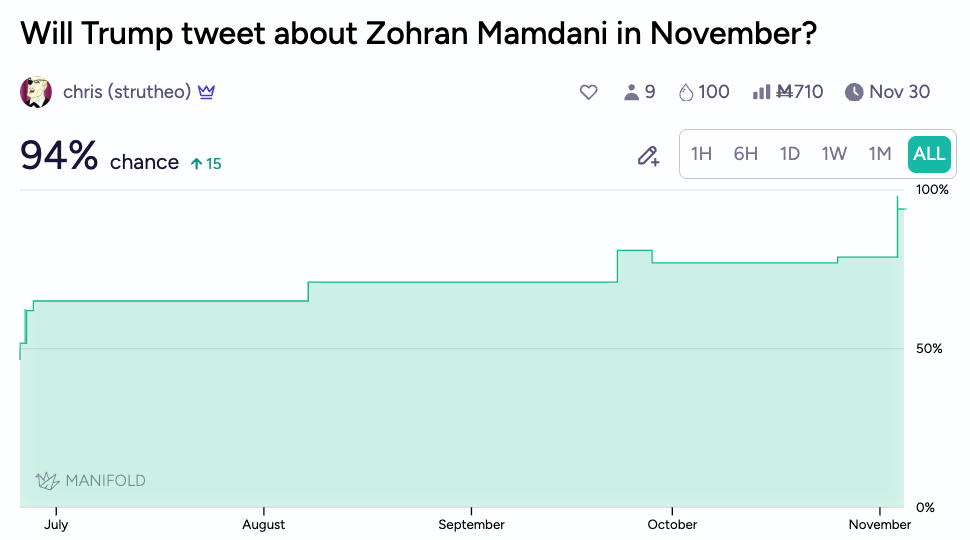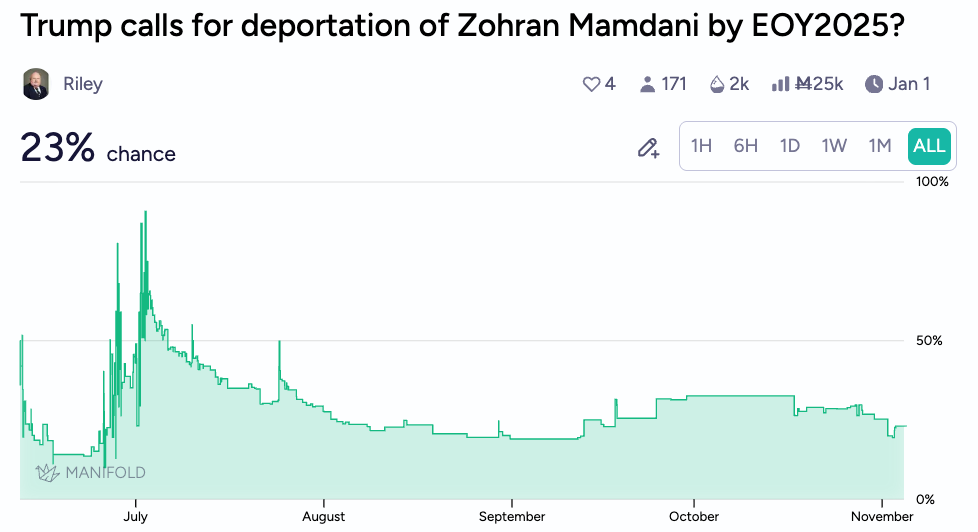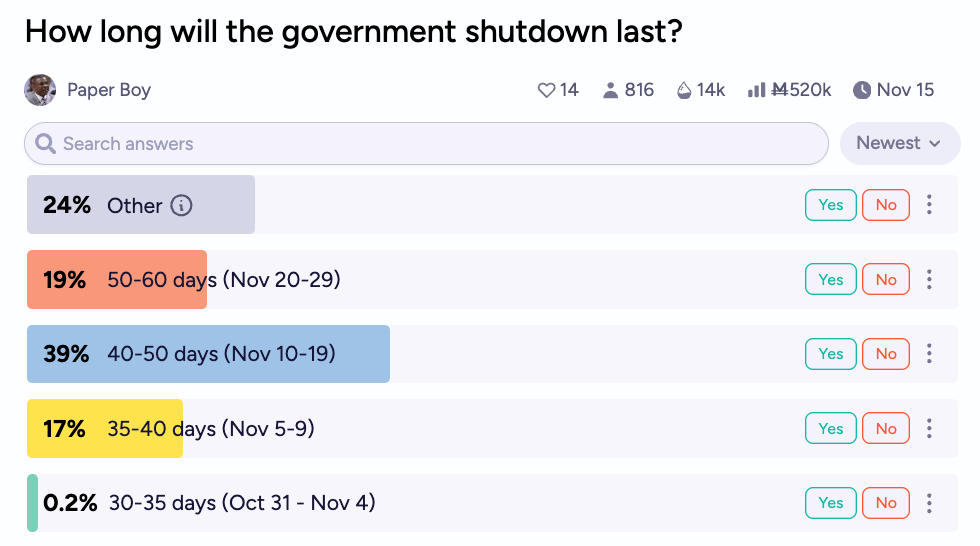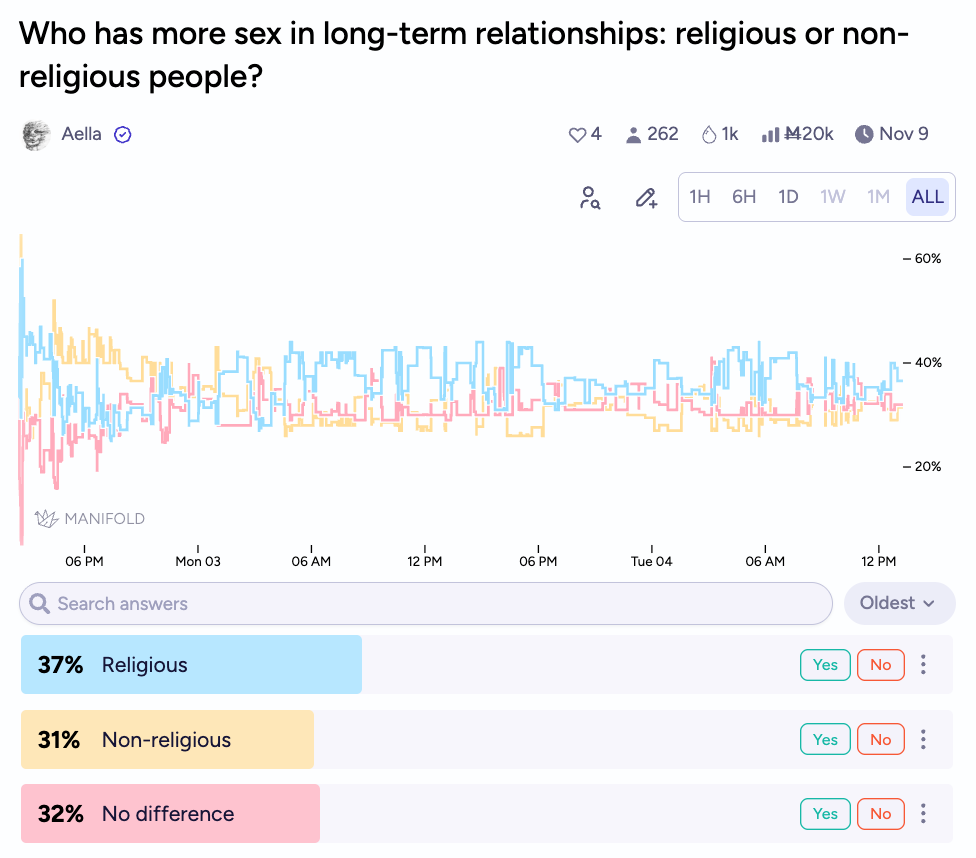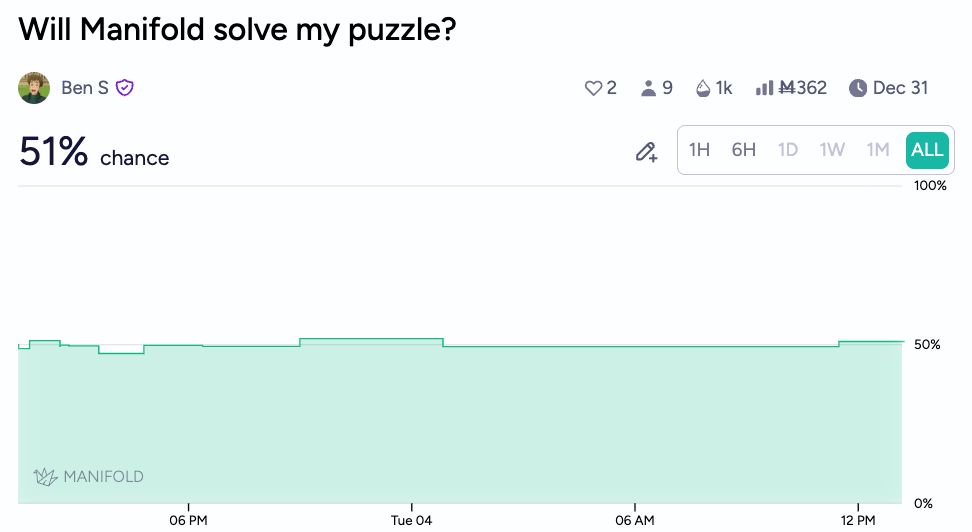Election Day Marketeering
Above the Fold covers an off-year election day
Mamdani vs. the Risk-Adjusted Discount Rate
Some have been calling Manifold Markets the Mamdani of prediction markets, and fittingly, Mamdani’s odds on Manifold have been slightly outpacing his odds on other platforms. Over the last couple weeks, the upstart progressive candidate’s odds have bounced around the mid-to-high 90’s, a few points higher than on Kalshi or Polymarket.
Leading by a dozen points in a highly-polled race, with momentum, vibes, voter enthusiasm, and the cultural zeitgeist on his side, it’s hard to imagine Mamdani losing tonight. Indeed, it would be a massive prediction market upset if that occurred, although readers should remember that 4% events do tend to occur 4% of the time.
What explains the discrepancy between Manifold and other prediction markets? I’d guess part of that might be due to there not being a lower-risk way to allocate Mana (as opposed to USD, which can be placed into a high-yield savings account or even the stock market). This helps provide a counter to the upwards pressure on low-probability events like a Cuomo win from gamblers seeking high return opportunities. But this doesn’t explain entirely why Manifold is sitting at 96% while real money prediction markets are at 91%, with market resolution within 24 hours.
Cuomo’s odds are so low on Manifold that users are developing interesting mechanisms for estimating it more precisely.
Resolves YES if Andrew Cuomo is elected mayor. If not, then I will generate a random integer between 1 and 10 inclusive. If it turns out to be 1, this market resolves NO. Otherwise, this market resolves N/A.
This mechanism is a little janky (almost 90% of the time, your mana is just returned to you), and if you read the description further, the 10x is imprecise and the market requires a reference conversion table. But it’s a neat innovation for estimating the probability of tail events.
Poor Curtis Sliwa, who has mostly been drawing headlines for his refusal to drop out of the race, doesn’t seem to have much of a hope of even finishing second, according to Manifold traders.
Mamdani has pretty decent odds—which spiked this morning, perhaps due to turnout estimates or weather conditions—of securing an absolute majority of the voters in this 3-way race, as well.
Traders think the modal outcome of the election will be a 10-20% margin in favor of Mamdani.
NYC is also voting today on a set of 6 ballot propositions, including 5 “charter amendments,” four of which Mamdani himself endorsed this morning. Question 6 was the one he declined to support, which would move NYC mayoral elections into even-numbered years. This makes sense; Mamdani’s voter base is certainly more engaged and politically motivated than the average New York voter, so moving the election to higher turnout years would probably, on the margins, slightly hurt his coalition’s chances.
Some Internet commenters have been critical of the NYC mayoral ballots, which have Mamdani and Sliwa listed twice. In fact, this is just how NYC mayoral elections work. This “fusion voting” is slightly idiosyncratic to New York, and has fallen out of favor across most of the rest of the US. While perhaps a remnant of Tammany Hall-era politics, candidates are constrained to running on certain party tickets. If multiple parties endorse the same candidate, then a vote for any of those parties is a vote for that candidate. Mamdani and Sliwa are each endorsed by two of the parties that have made it onto the ballot.
Virginia and New Jersey
Of course, there are elections happening all across the country. Nathaniel Rakich, of 538 fame, helpfully compiles guides to election nights in off-year elections.
Of these elections, the surprisingly-close Virginia and New Jersey governor races have been drawing national attention. The democrat, Spanberger, appears to have closed strong, and looks to be a near-lock to win.
In fact, Virginia’s election for attorney general is perhaps the more watched race in the state. Jay Jones has decent odds of beating Jason Miyares, the Republican incumbent.
However, in New Jersey, the race remains a little more uncertain, with Jack Ciattarelli hoping to improve on the Republican party’s stronger-than-expected performance in 2024 in the state. Even a close victory would likely set off alarm bells for Democrats, given that New Jersey’s 14 electoral votes are kind of a non-starter when it comes to winning federal elections.
More Mayors
There are in fact a couple of other high-profile big-city elections happening today. Progressive Omar Fateh appears to be trailing eight-year incumbent Jacob Frey in the Minneapolis election…
…progressive Katie Wilson has fairly good odds at unseating the incumbent Bruce Harrell in Seattle…
…and Mary Sheffield has completely run away with the open-seat election in Detroit.
Roundup
Trump appears to be a sure bet to tweet about Mamdani this month…
…although he appears far less likely to call for his deportation (Mamdani is a US citizen).
The shutdown continues unabated through election day.
Manifold is very evenly split on the potential effects of religiosity on long-term relationship dynamics.
Also, I just started running a puzzle game on Manifold. The first two hints are “Portugal” and “harbor”.
Happy forecasting!
-Above the Fold


